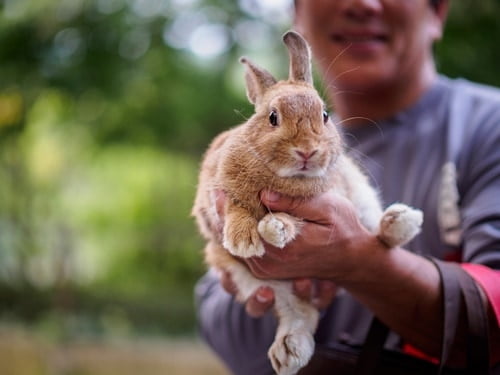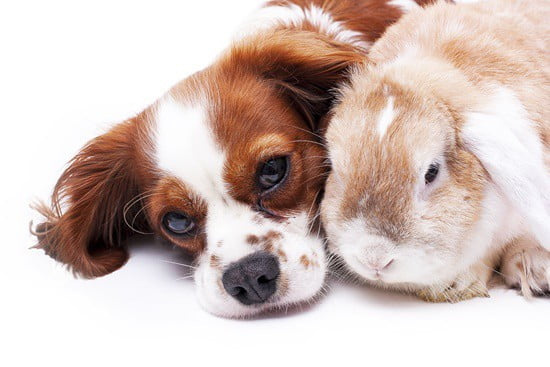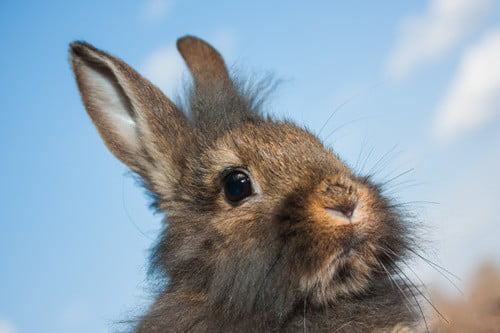Rabbits rely heavily on their sense of smell. In the wild, rabbits constantly sniff the air. They do this to detect food and check if predators are nearby. Domesticated pets have the same instincts, so you’ll notice that your rabbit’s nose is rarely still.
A rabbit’s sense of smell is up to 20 times better than a human. Rabbits sniff constantly, splitting their top lip while doing so. This enables a better reading of the scents in the air. Your rabbit is constantly checking for smells that warn of potential threats, such as predators.
A rabbit’s excellent sense of smell can be a negative and positive. While her keen nose keeps your pet safe, it’s also extremely sensitive. Strong artificial scents and dust aggravate a rabbit’s nose. Do not use scented chemicals around your pet, and regularly clean your rabbit’s hutch.
Do Rabbits Have a Strong Sense of Smell?
Wild rabbits have a nose so sharp they can smell food buried underground. In addition, a rabbit can smell predators long before they are visible. This, coupled with their speed, keeps wild rabbits alive.
You will no doubt notice your pet twitching her nose regularly. This is because she is sniffing the air around her. A domesticated animal faces fewer risks than a wild rabbit. Your pet will still be cautious, though. She retains survival instincts.
Rabbits do not only use smell to detect threats. Your pet can also sniff out friends using her keen nose. Your rabbit will learn your scent, and start to consider you as safe. She will also detect the presence of other rabbits.
Rabbits use their sense of smell to communicate. Like many animals, rabbits sniff each other on sight. They are releasing pheromones too subtle for a human nose to detect.
Because she has such an excellent sense of smell, your rabbit’s nose is sensitive. Be mindful about aggravating her nasal membranes. Avoid wearing perfume or cologne if you handle your rabbit. Do not use strong air fresheners either.
If a rabbit’s nose is agitated, it can lead to an upper respiratory infection. Dust, and other small particles, can also cause these concerns. A healthy rabbit will typically recover. All the same, these health concerns are worrying.
How Does a Rabbit Use Her Sense of Smell?
You will notice that your pet rabbit appears to sniff constantly. If your pet is moving her nostrils up and down, this is called ‘nose blinking.’ As Pet Helpful explains, rapid sniffing helps a rabbit gain more information about a scent.
Be mindful of agitated sniffing. This could mean that your rabbit is too hot. She is attempting to draw in more breath. If the temperature is neutral, a smell has caught your rabbit’s interest. She is attempting to assert whether it’s a threat.
If your rabbit appears calm, look closely at her while she sniffs the air. You will notice that her top lip separates. She has not hurt herself. This is an organic feature of your pet’s anatomy.
By opening her split top lip, your rabbit allows more air molecules to enter her nose. The twitching of your rabbit’s nose stimulates these molecules. Messages are then sent to your rabbit’s brain.

Based on these messages, your rabbit will react. If she catches the scent of a predator, she’ll flee and hide. If she smells her favorite human, she’ll run to greet you. If her nose detects food, she will not hesitate to investigate it further.
Rabbits also have the Jacobson’s organ, which many animals use to enhance their sense of smell. This organ is located in the roof of the mouth. This organ is used when an animal picks up a new, interesting airborne scent.
Most animals open their mouths to access the Jacobson’s organ. This does not apply to rabbits. They use the same split-lip technique that we just discussed. If your rabbit’s mouth is open, it suggests she is struggling to breathe.
How Important is a Sense of Smell to a Rabbit?
It is argued that a rabbit’s most essential sense is her hearing. Smell is a close second, though. A rabbit’s sense of smell is critical, for many reasons:
- Rabbits have good eyesight, but not perfect. Their vision is also tailored to acknowledge movement. Your pet will smell potential danger before she can see it.
- Rabbits have excellent hearing. This means that your pet can regularly be startled by loud noises. She will sniff the air, and connect a scent with a sound. This will tell the rabbit if she needs to be afraid.
- Rabbits are innately curious and territorial. Your pet will always want to explore new, untapped terrain and claim it for herself. Using her sense of smell, she’ll know if this is safe.
- Your pet leaves her scent on everything she encounters. She does this by rubbing her chin on an object, or you. Humans cannot detect this scent, but rabbits can. It means the rabbit has claimed the item or person.
- A male rabbit that has not been neutered releases a musky scent around a female. Female rabbits pick up on this scent. A spayed rabbit will flee or attack. An intact female will likely welcome the impending attention.
- Baby rabbits are born with their eyes closed. Most baby rabbits do not open their eyes until they are ten days old. Until then, they rely on scent to find their mother’s teat and feed.
Rabbits can make do without their vision, but their sense of smell will always remain critical. If your older rabbit stops sniffing the air, pay attention. It suggests that her health is failing.
Rabbit vs. Human Sense of Smell
The human nose is made up of around five or six million scent receptors. A rabbit has up to a hundred million of these cells. This means that a rabbit’s sense of smell can twenty times stronger than a human.
Also, humans lack the Jacobson’s organ that rabbits make use of. Humans can detect up to a trillion scents, according to the American Association for the Advancement of Science. With this in mind, imagine how many different aromas a rabbit can detect.
This is why your rabbit seems to see things that you don’t. If your rabbit stares into the middle distance, she is not ‘seeing’ anything. She is using her powerful nose to work out what she smells.
Rabbit vs. Cat Sense of Smell
A cat’s sense of smell is inferior to that of a rabbit. Feline noses are limited to around eighty million smell receptors. This is still vastly superior to a human, but it cannot compare to a rabbit.
Remember, cats are born predators. This means that a cat will hunt using her nose. We may not be able to smell a rabbit, but a cat can. Bear this in mind when keeping both animals in the same home.
Thankfully, a rabbit is likely to smell a cat first. This gives the rabbit time to run and hide. As rabbits are constantly vigilant, your pet will move at the first warning sign.
Rabbit vs. Dog Sense of Smell
How does a rabbit’s sense of smell compare to that of a dog? Canines have long been considered the gold standard for scenting animals. Dogs can follow a scent trail for miles.
Canines certainly have rabbits beaten in this regard. Dog noses are believed to contain three hundred million scent receptors. Your pet dog will detect aromas than even a rabbit cannot.

Dogs use their noses for different reasons to rabbits, though. Dogs are hunters, and rabbits are prey. Both animals will likely catch the aroma of each other. They will then react in different ways.
While a dog’s nose is more potent, a rabbit will be more aware of smells. If a dog is relaxing or dozing, they may ignore a scent. Rabbits do not have this luxury. Your pet will always be vigilant about smells, and ready to hide if necessary.
What Smells Do Rabbits Like?
If you wish to fill your home with scents that your rabbit finds agreeable, consider these:
- Food. Rabbits think with their stomach. If your pet smells food, she will be drawn to it. Sugary fruits are a particular favorite. Just be mindful that many human foods are toxic to rabbits.
- Roses. Just like sweet foods, sweet-smelling flowers will attract a rabbit. Roses, especially, will be a rabbit-magnet. Consider trimming the thorns of your rose bushes for safety.
- Other rabbits. This is not necessarily a smell that your rabbit will like. It depends on the rabbit in question. She’ll want to know what markings this other rabbit left behind.
- Pet Remedy. This is a product designed to soothe and calm animals through scent. Pet Remedy is made up of valerian, basil, sage, and vetiver. Together, these scents are appealing.
- Her own waste. It’s not sanitary, but rabbits take comfort from the smell of their own urine and poop. Leave a small amount of used bedding and litter in your pet’s hutch after cleaning.
- You. If you have forged a bond with your rabbit, she’ll enjoy your scent. You will be considered a source of comfort and pleasure. Don’t be surprised if a rabbit lies on your unwashed laundry.
What Smells Do Rabbits Hate?
Due to her potent sense of smell, your rabbit will dislike more smells than she enjoys. The wrong aroma can cause your rabbit stress. Be careful about exposing her to any of the following scents.
- Predators. Rabbits are mindful of the threat of predators. If you have cats in the house, their scent will upset your rabbit. Outdoors, think about fox or coyote urine on your lawn.
- Lavender. This plant has a reputation for being calming. It has the opposite effect on rabbits – your pet will loathe the smell. Avoid lavender room sprays or scented candles.
- Onions and garlic. These scents are repugnant to many humans. Onions and garlic are among the most effective natural rabbit repellents.
- Spicy scents. Rabbits also dislike spicy smells, such as chili powder or mustard. Do not leave open jars of these products lying around your kitchen.
- Perfumes and air fresheners. Strong chemicals irritate a rabbit’s nose. Do not douse yourself, or your home, in any artificial aroma.
It may take a little trial and error to find common ground with your rabbit’s nose. If she lives indoors, you may wish to mask any natural animal smells. Do be mindful of your rabbit, though.
Imagine living next door to a heavy metal band that rehearsed all day. The noise would drive you crazy. The same applies to a rabbit that is surrounded by bad smells. She cannot turn off her nose, and it will steadily cause her anxiety.
A rabbit’s sense of smell is akin to a superpower. These animals have evolved over centuries to trust their nose to keep them alive. Place an equal amount of faith in your rabbit’s sense of smell.
If your rabbit seems agitated by an aroma, then action must be taken. Calm your pet down, and reassure her that you’ll keep her safe. Just because you cannot see a threat, it doesn’t mean your rabbit cannot smell it.

